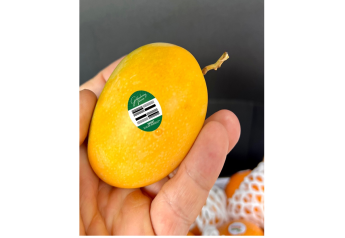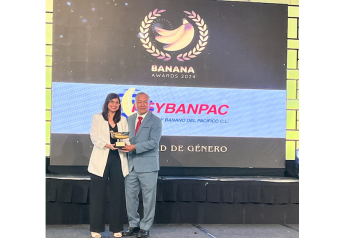A one on one with Tom Stenzel
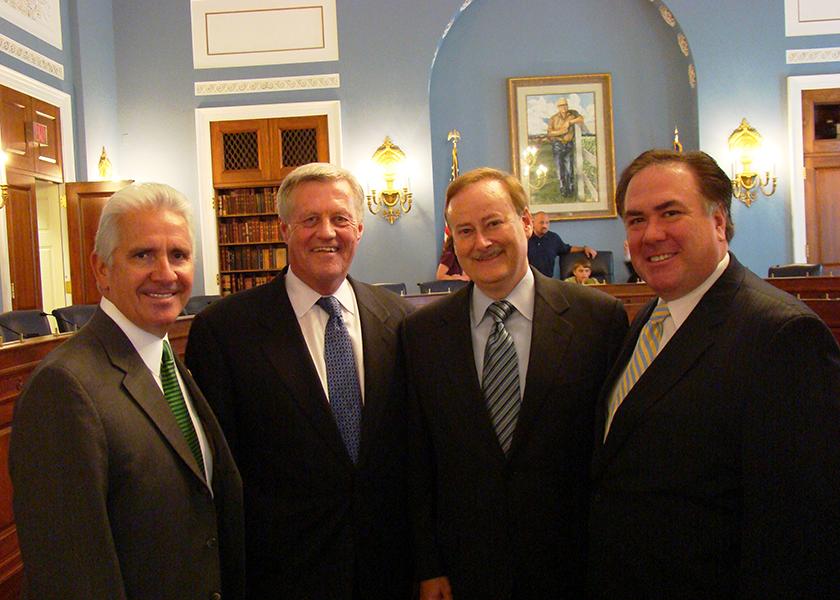
The Packer’s Tom Karst and Amy Sowder recently visited with Tom Stenzel to reflect on his long and storied career.
Since he became the leader of the former United Fresh Produce Association — which recently combined with the Produce Marketing Association to form the International Fresh Produce Association — in 1993, Stenzel has helped to engage politicians in Washington, D.C., to effect changes in government programs that have increased the profile of fresh produce in nutrition programs, ag policy and the farm bill. Here, Stenzel reflects with The Packer on some of the highlights of his era leading national advocacy efforts for the produce industry.
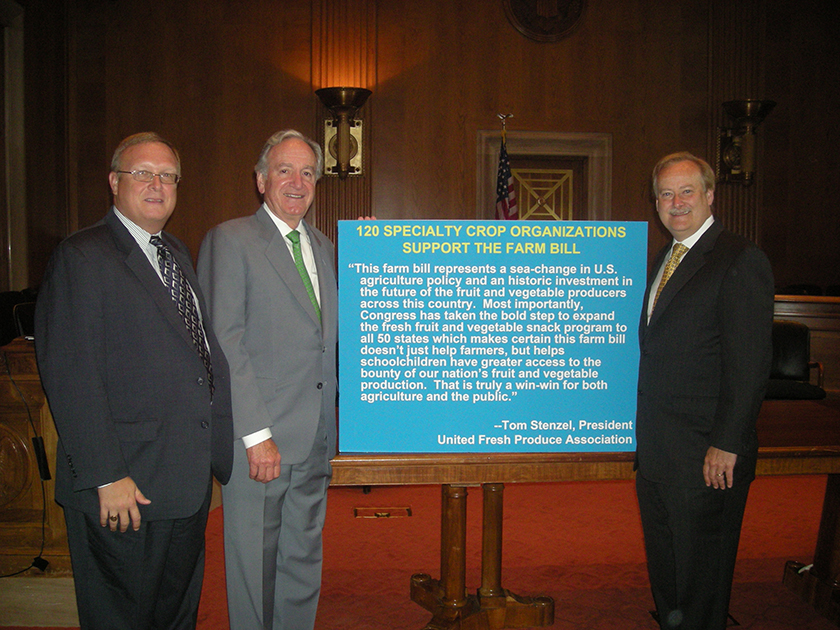
KARST: Tom, it is great to have you here with us and talk a little bit about your storied career. Tom, I was around when you came to the industry in 1993. As I remember, you came from a beverage association, correct?
STENZEL: Yes, in kind of a roundabout way. Actually, I had been with a group called the International Food Information Council for about seven years; I was president there. And previous to that, I worked for the American Beverage Association, also here in Washington, DC.
As I looked at what was happening in my career, way back then, the Food Information Council was a little bit more of a coalition. We did a lot on food safety and nutrition issues. But I really wanted to do something more in totality for an industry.
And when a search firm called and said, ‘Hey, would you be interested in talking with the fresh produce industry?’ I really jumped at that chance. And it's just been a blast ever since.
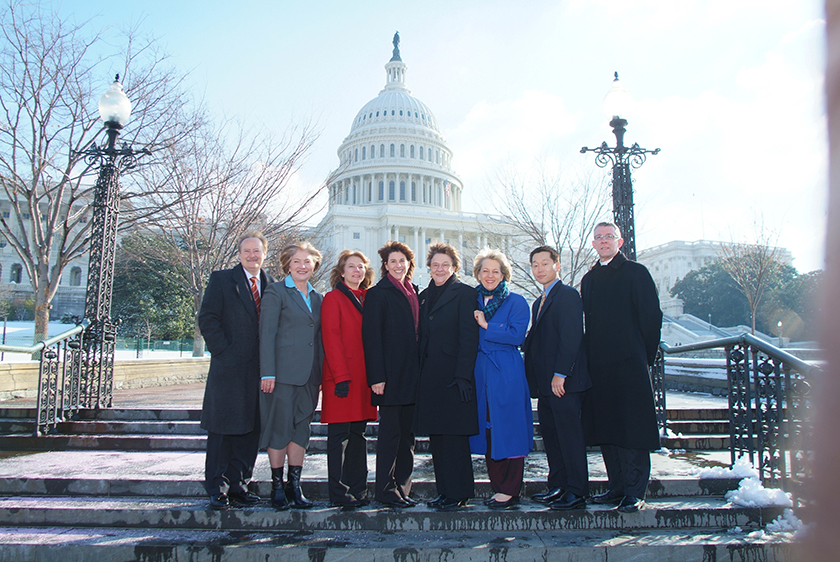
KARST: What was that first engagement like with the leaders of the association back then? What did you think when you first talked to leaders of the industry as you considered joining the team?
STENZEL: It's probably hard to put my finger on it at this point, Tom, but they felt very personal. It was a five-member search committee: Alan Siger from Consumers Produce in Pittsburgh — he is the last one who's still with us — Bill Heinz, Roger Jones, Gene Batagglia and Richard Graves; a number of my dear, dear friends over the years. But it was a more personal interview. In my previous jobs, I had been working with the consumer-packaged goods companies, very corporate. It was a real distinction when you started talking with people who were in family businesses. In fresh produce, we are unique, I think.
SOWDER: What are some of the early memories you have from the early 90s of getting familiar with the industry and, then, the association?
STENZEL: Roger Jones was chairman at the time when I started — a potato grower-packer-shipper out of Idaho. So, one of my very first trips was to the Idaho Grower Shippers Association annual meeting. I got to meet a number of people there, and then I really traveled that first year.
It's funny because you think we're one industry. But John McClung, who was the head of government affairs here when I started, told me one day early on, ‘Tom, you think you've joined one industry, but you've really joined dozens.’ And I think that's true. Every commodity group functions in its own way; different regional groups, also. So, for me, it was a very big learning curve to really start to understand all the different facets of the fruit and vegetable sector.
SOWDER: I think my first year also was a lot of traveling. And I remember how eye-opening it was to visit an apple-packing facility. And, then, a mushroom place, which was completely different. How did you find what your passions were within your role; did you find pet projects?
STENZEL: I go back to the earliest days. And one of the things that I found challenging is, honestly, at the time, United Fresh Fruit and Vegetable Association [the former name of United Fresh Produce Association] was not necessarily on the strongest leg. There was a real need to identify who we really were. I worked with the board of directors that first few years to really hone in on who we wanted to be as an association, and how we would serve our members. And we ended up having a moment of truth. Tom, you'll remember the fight over the Perishable Agriculture Commodities Act, the PACA. In 1995, the retail supermarket industry actually tried to get the law changed to get rid of the PACA. And it really forced us to take stock of who we are as a produce industry. We love our customers. We work closely with retailers; they're essential to our success. But at the same time, we had to define ourselves as a produce industry association.
We fought to maintain the PACA, even though it kind of hurt us a little bit in convention attendance and things like that, from the retail side. But it was important to really show the identity. And I think that put United on the right path forward in those early days. And we were able to grow from there with very solid support from the broad industry.
Listen to the Tip of the Iceberg Podcast — Tom Stenzel on produce industry past, present, future
KARST: I do remember that time. And there was a whole political element to all that and how that unfolded. And, somehow, you were able to navigate that and to salvage the PACA, which was important to the industry, wasn’t it?
STENZEL: It was a strange fight because it was almost like brothers fighting or an inner family feud. Because the retailers are our partners. So, it really didn't make sense. The retail produce leaders actually understood the value of PACA; how important fair-trading standards are in our industry. It was some of the other folks at retail, whether their lawyers or financial folks, who didn't quite understand why produce had this special case. But the reason for PACA in the first place is that we have a perishable product that, if you have a dispute, there's no way you just hold the product while you're figuring out the negotiation. The product goes away. So, it was important that we were able to maintain those fair-trading standards.
KARST: When you think of the packet full of issues that United is always engaged with, United Fresh and now IFPA, how do those few issues back in the 90s perhaps compare with industry concerns right now?
STENZEL: I don't think we see anything quite like that PACA battle. There still going to be differences of opinion throughout our industry. We see it in trade, we see it in different regions concerned about imports to the U.S., while many of our members are major importers. We have to balance all of those issues. We’ve really tried hard at United Fresh to be transparent. You have to get all voices in the room together, you have to have the full supply chain and then you sort out what's best for the entire membership. I believe IFPA will continue to do that, as well. I've got a lot of confidence that the organization is well-positioned to do that.
SOWDER: So a national association must represent the interests of both U.S. growers and U.S. importers, correct?
STENZEL: That's right. So, you try to balance that. Again, I'm going to say it comes back to fair-trading standards. There are laws in place that take care of dumping issues and illegal support, and governments providing illegal support to certain industries. There are systems that address those issues. Nobody really likes competition. But fair competition usually makes us better. And that's one of the things that I've seen also, over the years, that the companies that have succeeded and grow are ones who embrace competition, embrace the future, and are always trying to improve. That was something we tried to also do as an association. We weren't here to defend the lowest common denominator in an industry. We wanted to help the industry advance.
KARST: What are some of the things you are most proud of?
STENZEL: On the program side, it has to be the Produce Industry Leadership Program. When we launched that program with DuPont all the way back in 1995, we had no idea how its impact would shape this industry. Consider 12 young leaders chosen competitively each year for 26 years. They now serve in leadership positions in every association, commodity board and group throughout produce. They are CEOs of their companies, presidents of associations and leaders in marketing, operations, sales, food safety and every discipline. That program truly shaped the industry we are today.
Looking back at more of the issues, I have to mention food safety first. There’s no more important issue for industry and United was always at the forefront, trying to drive food safety standards and policies. We hired the first Ph.D. in any association and helped develop good agricultural practices that made sense. After the spinach fiasco of 2006, we led the charge to get [the U.S. Food and Drug Administration] to take responsibility for food safety, and while outbreak investigations are still a challenge, we don’t shut down entire commodities for three months when they occur.
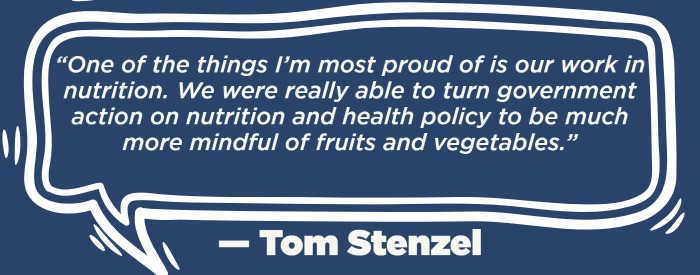
One of the things I'm most proud of is our work in nutrition. We had the 5 a Day program back when I started, but that was about it. And we were really able to turn government action on nutrition and health policy to be much more mindful of fruits and vegetables, changing the school lunch program, getting the Fresh Fruit and Vegetable Snack Program, working to include fruits and vegetables in the [Special Supplemental Nutrition Program for Women, Infants and Children] program — some real key accomplishments. I think that's where an industry has its strength, in the association coming together.
SOWDER: You really hit some notes there that I'm pretty passionate about.
KARST: And Tom, I don't know if you were the inventor of the phrase, ‘A rising tide lifts all boats,’ but it seems like you are, anyway. You really, emphasize that, you know, hey, this is good for the overall industry. It's going to lift everyone up.
STENZEL: I certainly didn't invent that, but I do believe it. I think that our opportunity as an industry is always the next step ahead. You know, it's not clinging to the way we used to do things. When you look today at technology, and what's coming into the industry, we are having to learn as fast as we possibly can. The research and development function has never been more important, whether it's field labor or the packing house, or artificial intelligence in sourcing and buying. There are just so many things that continue to help the industry grow and succeed.
SOWDER: What do you think you will miss the most about being CEO of United Fresh or co-CEO of the International Fresh Produce Association?
STENZEL: Amy, I think probably more than anything else, it's the people. This industry has become my family, as well. So, I will miss seeing everybody at board of directors meetings and conventions, although I'm going to stay as much as I can in the industry. I've started a little consulting practice. I probably won’t be working 80 hours a week, the way I did for many years. But I’ll cut back to about half and hope that I'll be very involved with a number of industry members.
SOWDER: When you think back on your career, what personal qualities resonated with the United membership?
STENZEL: I’ll go back to that first interview I was describing where it felt very personal. And that's pretty much the way I've operated here at United, and hopefully made some impression on the IFPA moving forward. Produce has generally been a family business. There is more corporate involvement and more private equity involvement today, but this is still an industry that operates on a handshake, on a hug. We're very friendly, even with competitors. People almost always help each other out. And that was the way I always tried to manage the association. So, I think, in that sense, United was a family business, operating to support a number of families throughout our produce industry.
Read related: The thing about Tom... read what industry professionals have to say about Tom's illustrious career so far.
SOWDER: And you have to be very careful, everything is so political. And you have a fine balance, you know; you have to walk a fine line between all the other family members.
STENZEL: It's funny, because, as I've watched families in the produce industry having to navigate the same things — sons and daughters, which child is going to move in to become the CEO, when do you bring in an outside consultant, sometimes a nonfamily member CEO — but what makes families successful is you don't hide from those issues, you address them head on. For an association, you can't hide from those tough issues either. You have to have the right people in the room, you have to have frank and open conversation, deal with your differences.
But just like families, you know, the association has to move forward and make decisions. Hopefully, the board of directors we've had were successful in that approach. Thinking about who I will miss the most, it's all of those folks who've served on our board and other association committees and councils over the years, that really did drive this association as much as I did.
KARST: You talked about communication and the dynamic of coming together, with maybe no better example than when United and PMA came together to form IFPA. What made it the right time to come together versus maybe back in the 90s or 10 years ago?
Read related: PMA and United Fresh to create new global trade association
STENZEL: As you know, and I think everybody who's reading this will know, there were many times when United and PMA flirted with that possibility. I’d say there were a couple of reasons why it worked this time. One of the most important was the relationship that I had developed with [current IFPA CEO] Cathy Burns at PMA.
Cathy is a great leader and someone that I've respected. We started working together on produce traceability, even before she had joined PMA when she was still at Food Lion. But we got to know each other on a number of issues like that. So, when we actually sat down to start talking, there was mutual respect there that made the conversation go well.
Why, in the big picture? I think both associations kind of came to a point where we realized that we could be more effective together. PMA was very good at certain things. United was very good at certain things. But, by teaming up, we could be better at everything. So, in that sense, as long as the association staff are putting the industry first, it only made sense. So, having a mutual partner that shared that philosophy is what brought it together here.
KARST: I know back in the 1990s, one of the points of conversation was will this new combined organization devote enough resources to lobbying, which of course has been your bread and butter over the years. How do you feel about that? What's your sense now of the lobbying element of what IFPA will be in the future?
STENZEL: Well, I can tell you that IFPA is doubling down on lobbying, legislative functions and government relations. That's another reason why we came together at this point. If Cathy and her board had not shared that philosophy, I probably wouldn't have let it happen, to be honest with you. Because that was an essential part. We, as IFPA, have invested more heavily, and we've added staff positions. So that is going to be a key factor going forward.
It's a question that's still out there. And I'm actually glad you asked it, because, as I've traveled this past year, I get that question from member companies and associations. Seeing is believing, but we had our first major Washington fly-in (in May), and then, we also are going to have the September conference, as well. And you'll see more and more activities, I think, taking place in this realm with IFPA.
KARST: And kind of following on that point, this COVID-19 pandemic has been unlike anything. It's crazy. And I know, in D.C., it's changed a lot, as well. Is it getting back to normal; what's your sense about that?
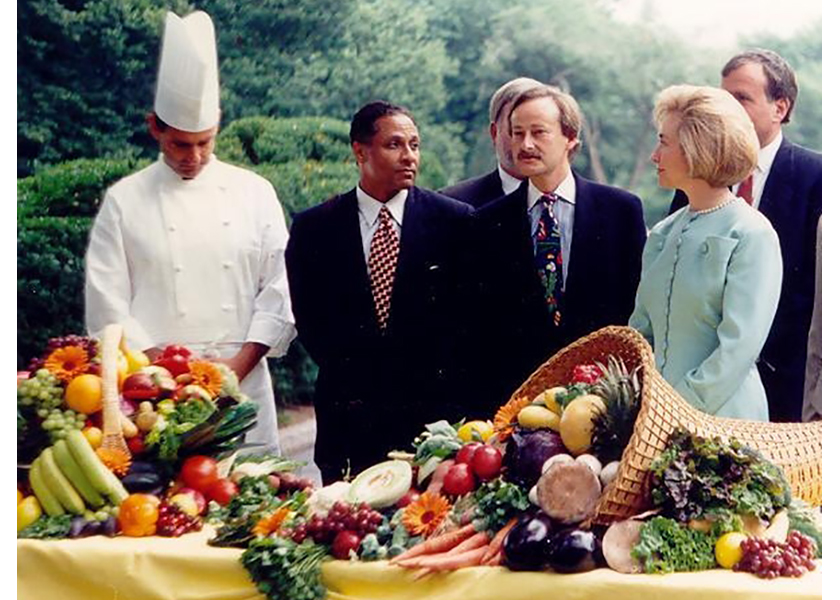
STENZEL: The buzzword is the ‘new normal,’ which we all use too much. But I don't think it's going to be the same as it was. I do want to see business and interaction with government get back to being more personal again. We could only talk with members of Congress on a Zoom, and just like everybody in business, it did give us a new way to connect.
So, in that sense, there's some positive that's come out of it.
But building relationships, having lunch together, spending time with staff members, you know, a lot of what we do is not glamorous, let's go see the famous senator. A lot of what we do is build relationships with that senator’s staff. So, when someone's 23-24 years old, just out of college, comes to work in a Washington congressional office, we try to help them.
We get to know them. Five years from now, 10 years from now, they're probably going to be chief of staff for somebody. So, a lot of that relationship-building we're not getting during the COVID days. So, I do hope that we can build that backup.
SOWDER: How do you start those relationships?
STENZEL: I mentioned reaching out to the younger staff. That's always part of it. Last year, I think we had 60 or so new members of Congress come in. So, every year, when there's a new Congress seated and somebody's coming here for the first time, we will actually take them a fruit and vegetable basket, will introduce the association to their office. So, you've got the congressperson, then you've got a chief of staff and usually got an ag staff person if they're at least related to agriculture at all. But trying to introduce ourselves to all of those different people has been a real key in the way that you build those relationships.
There will generally be a group that we work with more closely. The agriculture committees, the nutrition committee, the small business committee. The other piece of our work in D.C. is the whole regulatory side dealing with the USDA, the FDA, the [Environmental Protection Agency] or Department of Labor; that is as important as dealing with the politicians.
It's dealing with those appointees, whether they're the secretary of agriculture or all of their key staff. Again, you build relationships. The individual today who is the head of the Agricultural Marketing Service, Bruce Summers, actually was running the PACA program 20 years ago. He's moved up in his career where he's now the administrator of the AMS, and that's great that we've had that relationship with him for that many years.
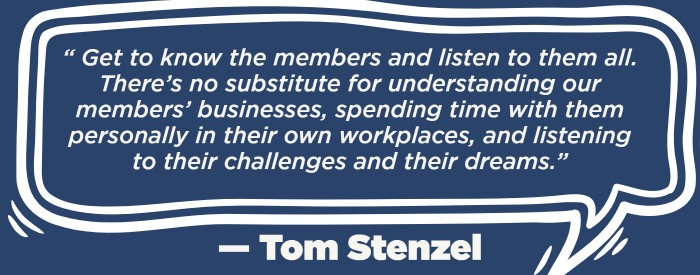
SOWDER: Tom, I want to thank you for how much good you've done over the years, for not just the industry and the companies and families that run them, or the people who aren't families who run them, but the general public. I mean, fruits and vegetables in nutrition programs really do affect everyone; (people) in a low-income situations can get fresh produce.
STENZEL: Well, Amy, you are very kind to say that. And, I have to say, I'm a bit touched. Because I believe that, too. We're not just doing it to make a profit. You know, what's the saying? ‘Do well by doing good’ And, if there's ever an industry, it's the fruit and vegetable industry that does good in the world. We feed people with the healthiest, best products known to man.
The more we can deliver that to people in need, people who may not be able to shop at the highest-end stores, which is making a real difference. I appreciate you saying that.
SOWDER: Doesn't it feel good to have worked in an industry that makes everyone healthier?
STENZEL: Absolutely, and I want to continue. I'll still be able to contribute on a couple of different boards that are in this space. We've got a group here in D.C. that I really love. It's called the Bipartisan Policy Council and was formed by Democrats and Republicans about 20 years ago to really bring together a bipartisan group to look at major issues. We now have a nutrition policy group there that I'm part of, looking at how we can change policy to do exactly what we're talking about, to get more healthy foods to people. I’m thrilled to sit with two former secretaries of agriculture, Chef Jose Andres and many other public health leaders tackling those issues.
KARST: As you reflect on your 30 years with the fresh produce industry, what has been the hardest issue to make progress on for the industry in D.C.? Why is it important to see movement on that issue?
STENZEL: Clearly the toughest issue we’ve faced is securing a reliable labor force for agriculture. That includes legal status for the current workforce and a new or modified foreign guest worker program. We’ve come close several times, but outside politics always seems to trump common sense. Members of Congress have known how desperately we need a reliable workforce, but we’ve been dragged down by broader immigration issues and sometimes by just partisan politics.
KARST: What is one piece of advice you would give to a newly minted leader of a produce association? What makes an association leader successful?
STENZEL: Get to know the members and listen to them all. There’s no substitute for understanding our members’ businesses, spending time with them personally in their own workplaces, and listening to their challenges and their dreams. Then, association policy and programs are coming from a place of industry knowledge, not an isolated outpost. Produce is a relationship industry, and relationships are key to an association leader’s success.
SOWDER: Besides being active on different boards, you are doing a consultancy. What kind of things will you want to do?
STENZEL: It's funny, because, oftentimes, people say, ‘Oh, I'm going to be a consultant,’ and then they go get their next job. Never say never, just in case the perfect option fell in my lap. But for me, I don't think it's ever going back to a full-time single position. But I do want to help, I do want to help companies in our industry. I'm not just a Washington lobbyist. After 30 years here, I think I've learned a lot about this industry. I've been able to observe the most successful people, how they achieve their goals. I'm looking forward to spending more time with certain companies and associations also. Being an association executive is sort of jack of all trades, master of none. I look forward to spending a little bit more time with some individual companies or associations; really, just trying to help them in their success journey.
SOWDER: How should people reach you going forward?
STENZEL: I've got a new email. It is tom@stenzelgroup.com. And I'll certainly love to talk with anyone. When I was thinking about a name, I chose the Stenzel Group because I've met so many good people that I can bring in others on specific projects. If we're doing something in retail, I know a number of successful retired retail execs, and vice versa. If a shipper needs some counseling, I've got a number of friends out there who I could bring together to help serve.
KARST: You have had so much to offer the industry and, again, it's been an honor to visit with you, Tom. And, Amy, I'm sure you share that with me, and we really appreciate your time.
STENZEL: Thank you, Amy. Thank you, Tom. It's been great working together all these years and let's stay in touch.






